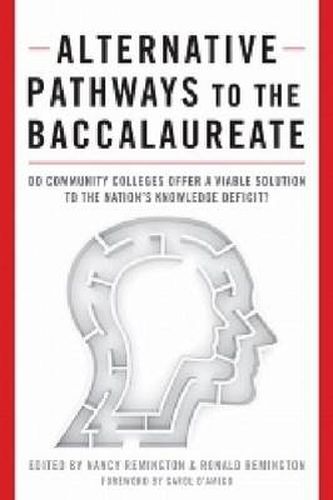Readings Newsletter
Become a Readings Member to make your shopping experience even easier.
Sign in or sign up for free!
You’re not far away from qualifying for FREE standard shipping within Australia
You’ve qualified for FREE standard shipping within Australia
The cart is loading…






The community college, or applied, baccalaureate continues to be controversial although now approved by legislatures in eighteen states. Does it contribute to economic development and social mobility? Does it fill a major gap in our educational system and, if it does, what are the paths to wider adoption?
Opening with a brief historical account of the community college baccalaureate movement, this book then situates the baccalaureate in the context of demographic trends and workforce needs; addresses concerns about mission creep and the impact on four-year colleges; offers insights into the political arguments arrayed for and against wider adoption; and looks at the implications for accreditation.
The contributors review the capacities of four-year colleges to deliver training for technical occupations; the ability of community colleges to deliver rigourous, high-quality courses; and consider issues of access, affordability, faculty development, and responsiveness to changing needs. A chapter devoted to student voices provides the critical perspective of this constituency.
The book concludes by describing examples of implementation across the U.S., reviewing different models of articulation, as well as promising practices that include eliminating the need for transfer altogether.
This book provides vital information and new research for policy makers, community college leaders, and scholars of higher education.
Published in association with the Community College Baccalaureate Association
$9.00 standard shipping within Australia
FREE standard shipping within Australia for orders over $100.00
Express & International shipping calculated at checkout
The community college, or applied, baccalaureate continues to be controversial although now approved by legislatures in eighteen states. Does it contribute to economic development and social mobility? Does it fill a major gap in our educational system and, if it does, what are the paths to wider adoption?
Opening with a brief historical account of the community college baccalaureate movement, this book then situates the baccalaureate in the context of demographic trends and workforce needs; addresses concerns about mission creep and the impact on four-year colleges; offers insights into the political arguments arrayed for and against wider adoption; and looks at the implications for accreditation.
The contributors review the capacities of four-year colleges to deliver training for technical occupations; the ability of community colleges to deliver rigourous, high-quality courses; and consider issues of access, affordability, faculty development, and responsiveness to changing needs. A chapter devoted to student voices provides the critical perspective of this constituency.
The book concludes by describing examples of implementation across the U.S., reviewing different models of articulation, as well as promising practices that include eliminating the need for transfer altogether.
This book provides vital information and new research for policy makers, community college leaders, and scholars of higher education.
Published in association with the Community College Baccalaureate Association